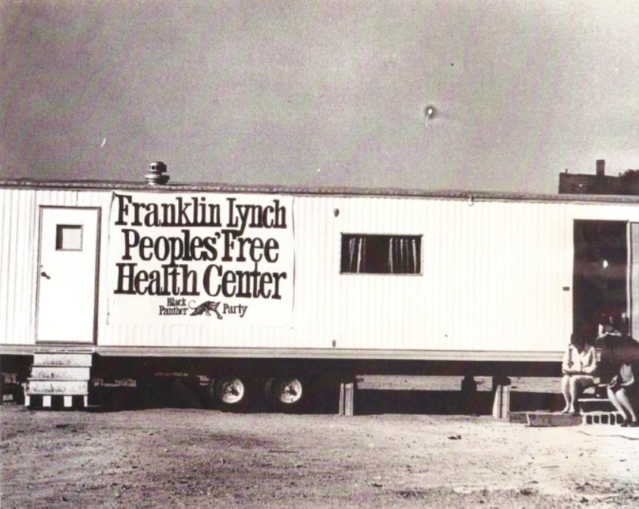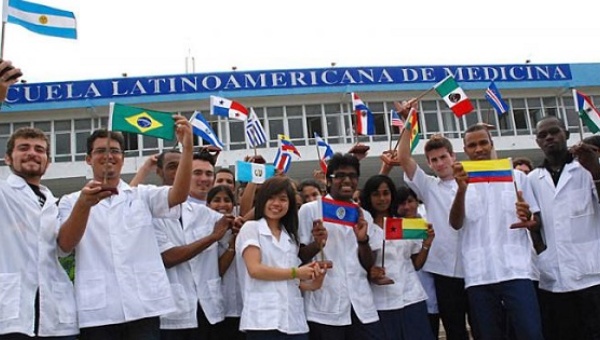Disability rights and justice − for the people, against incarceration

Black Panther Party-run free medical clinic in Boston, 1970.
The following was excerpted from a July 29 webinar held by the Disability Justice and Rights Caucus of Workers World Party that emphasized the interconnections between the struggles of disabled people and incarcerated people. Caucus members participating below were Brian Shea and mYia X. The entire webinar can be viewed on YouTube at Workers World Party. (youtube.com/user/wwpvideo)
mYia: The Black Panthers made it a priority that every single chapter had to have a medical clinic. Members of the Panthers really took a look at why health care had to be at the top of the list, because they saw the level of racism and neglect — and also the profit the medical industrial complex was making. The Panthers initiated the free health clinics to combat health problems which existed amongst the poor and the oppressed. And to this day, we still see that. The drug companies, the insurance companies, the equipment suppliers, the private hospitals are still taking huge profits — and that includes profits from the prisons and jails.
To this day, members of the Black Panther Party, who have spent decades behind the wall, are dealing with multiple illnesses and disabilities. These are our warriors that we’re fighting for on this side for justice, for their rights and ours, for all of our people. The work that the Black Panther Party and their clinics were able to do — that really stands out to me. And that Party was definitely influenced by what was happening in countries working toward socialism — Cuba, North Korea, China.
Cuba’s socialist vision
Brian: I was in Cuba during some of the most severe parts of the Special Period, when the Soviet Union was killed, and Cuba lost it as a trading partner. The U.S. had tightened the illegal blockade through the Torricelli Act in 1992 to try to squeeze Cuba.
I was down there at that time, when there were disabled folks organizing each other through the social organizations, through schools, all kinds of ways. To bring forward into society what the specific needs were of all disabled folks. They were everywhere from the neighborhood CDRs [Committees for the Defense of the Revolution] to the women’s organization, to any other organization in Cuban society.
Even though the material resources were thin, and Cuba was still being punished by the illegal blockade, there was, and is, a political priority that sets the first needs to get addressed as the needs of the people — and not the needs of shareholders or corporate donors or anything else.

Medical students wave their countries’ flags in front of Cuba’s international public medical school, whose mission is to “contribute to the training of Primary Health Care physicians in diverse regions of the World.” Tuition, accommodation and board are free; students receive a small stipend.
mYia: Comandante Fidel and the Cuban people created ELAM [Escuela Latinoamericana de Medicina]. That’s the Latin American School of Medicine, the medical school in Cuba. It opened on November 15, 1999. To take a quote from Fidel Castro, its spirit in solidarity will be so deep that it will never be erased.
We know that Cuba every single year does so much for its people. Even when hurricanes happen, few lives are lost because from the elders to the youngest and even the animals, there is a plan that takes care of people.
In the U.S., people displaced in Hurricane Katrina in 2005 to this day are still displaced, and parts of Louisiana are still decimated. That rips the bandages off to show you this country that some say is the richest country in the world. But that depends on what is your measure of rich? Is your measure of rich only about what you gain from capital? Or is your measure of wealth the quality of life for your people, the quality of life for the inhabitants of the country, its humanity? And that’s what we see in Cuba.
Even myself — going to Cuba and having to engage the health care system because I had an allergic reaction — I didn’t have to sit in an emergency room for four to five hours, be asked questions about my insurance and what’s covered, not covered, or Medicaid, or what is the medical necessity. Within 5 to 10 minutes, I was being seen by Cuban medical staff; the problem was assessed; I was given care. I was told what to do and that I was able to leave. I wasn’t given a bill. I wasn’t asked any questions about money or any of that.
People cared to make sure that I was feeling better. And they do that every single day since the revolution. And Cuba sends care where there are disasters in other parts of the world, even while they are taking care of the citizens in Cuba. Cuba prioritizes the lives of people. It’s not about profit.
U.S. profits from incarceration
mYia: The U.S. prison-industrial complex is built on profit. And when it becomes privatized, all the problems are exacerbated. Just last week we heard that prison systems that released people from incarceration because of the COVID-19 crisis at the height of pandemic, the prison authorities are telling prisoners they must return back to prison!
This system is a vicious beast that we are living under. I think about Mumia Abu-Jamal in prison [since 1982], again on the brink of losing his life [from health problems], because the system is trying to kill him by any means necessary. And if not for the movement, which includes the disability rights and justice movement here and around the world, Mumia and so many other political prisoners would already be dead.
And to quote George Jackson, if you are incarcerated, the mere fact that the system is so corrupt makes them all political prisoners. So we’re not differentiating one prisoner over the other.
We call for the abolishment of prisons. We don’t stand with “reform” for a “kinder, gentler” incarceration system that would still keep our people in the system of incarceration. We call for releasing people now and give them the resources now — especially when we think about this pandemic.
How many billionaires have continued to increase their coffers during the pandemic — the amount of money that Jeff Bezos has made — a man that superexploits prison labor, especially since he acquired Whole Foods. Even within the pandemic, the people are given a minuscule amount of resources, while so many others are stacking and packing their accounts.
Right in our faces, we see what is happening around the world, where countries can’t get access to what they need, aren’t allowed, because of sanctions, to be able to send or receive resources to be able to take care of their people. It’s the same thing we see happening here in the United States, the same thing we see happening behind the walls of mass incarceration.
We have to continue the struggle. We have to continue the fight because this is injustice.

